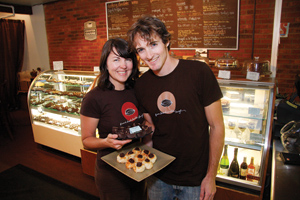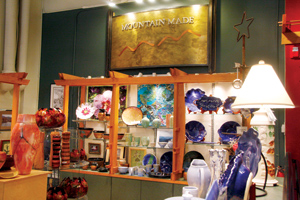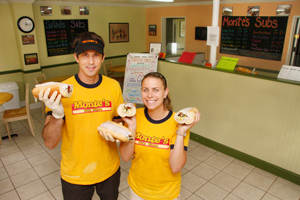If it weren't for Mountain BizWorks, Monte's Sub Shop co-owner Daniel Ruiz says he wouldn't be in business today. That's a sentiment shared by many of the 3,000-plus alumni who've received loans, taken courses, attended workshops and received technical assistance through the organization since its founding, 20 years ago, as the Mountain Microenterprise Fund.

A lot of those graduates run small businesses, typically employing only a handful of people. Collectively, however, they pump some $50 million into the local economy each year, the nonprofit estimates.
"In this region, Mountain BizWorks matters," declares Shaw Canale, the new chief executive. (The group's name was updated in 2007.)
Ruiz agrees. About a year ago, he and his wife, Monique (aka "Monte"), received a BizWorks startup loan that paid for equipment and renovations at the Hendersonville restaurant. "That's the only way we would have gotten funding for the venture, because I don't think we would have received a conventional loan," says Ruiz.
The 31-year-old had never owned a business before, he reports, though his wife had restaurant experience. And they got the loan right when the economy was about to tank, Ruiz recalls. "I wouldn't have loaned money to me," he told Sen. Kay Hagan when she visited BizWorks in late June to talk about health care.
But the Ruizes did have a well-researched business plan and the conviction that Western North Carolina was hungry for a local sandwich shop featuring a few south Florida twists (he'd previously worked in Fort Lauderdale). "Mountain BizWorks listened to us and had faith that what we were doing was a good idea," he notes. "They didn't look at a bunch of statistics and strict criteria to make the decision. It was almost like they had a gut feeling about us and went with it!"
In fact, the nonprofit specializes in providing loans and services to folks like the Ruizes — particularly minorities, low-income residents and women, says former CEO Greg Walker-Wilson, who left in June to do volunteer work in Colombia. "We've always been concerned with helping entrepreneurs live out their dreams and support their families," he reports. When Walker-Wilson was hired as a grant writer in 1997, the nonprofit had just two full-time staff, one basic training course and a $2,500 loan limit. These days, Mountain BizWorks offers a variety of workshops, one-on-one business coaching and loans up to $50,000.

But only about 15 percent of clients even need a loan, he notes. "More of them need help creating a business plan, [learning] QuickBooks [or] improving their marketing," Walker-Wilson explains. Accordingly, Mountain BizWorks now has more than a dozen full-time staff, about 25 part-time consultants and two satellite offices (Sylva and Hendersonville) serving a dozen WNC counties. There's also a network of committed business owners who help one another along.
"It's amazing what [BizWorks] has been able to do, says Chris Just, the group's first director. "It's one of the best small-business-development programs in the country."
That sterling reputation is part of what enticed Canale, who was living in Seattle, to apply for the job (see the Aug. 16 blogpost, "Mountain BizWorks Hires New Executive Director"). BizWorks, she notes, is one of only eight such organizations nationwide selected to take part in the Washington, D.C.-based Scale Academy for Microenterprise Development, which will provide training, financing and technical assistance to help them expand the scope their work while providing a model for other groups. "I've known many well-run microlenders," says Canale, who's worked in the field for more than a decade, "[but] few as energetic or as innovative" as Mountain BizWorks.
Humble beginnings
It all started back in 1989, when the N.C. Rural Economic Development Center funded a tiny pilot project headquartered at Warren Wilson College. It focused on home-based and mom-and-pop operations: Marshall toolmaker Charles Wilkins, for example, and aspiring restaurateurs such as Joe Eckert (Laughing Seed Café) and Hector Diaz (Salsa).
Microfinance — making very small loans to very small businesses — was relatively new in the U.S., Just recalls, though it was based on a model created in the 1970s by Grameen Bank founder Muhammad Yunus, who shared the 2006 Nobel Peace Prize for his work.
"The first person he ever gave a loan to was a woman [who] made baskets," says Just, who coordinated Yunus' 1990 visit to WNC. Like many impoverished villagers in his native Bangladesh, the woman had to borrow the money to pay for her materials. But after paying off the high-interest loan she was making about 2 cents per day. Recognizing that the woman would never escape poverty that way, Yunus (who earned a doctorate in economics at Vanderbilt University) loaned her and other villagers about $25 to help them cut out the middleman. That marked the start of the Grameen Bank, which focused on low-income entrepreneurs and used peer pressure, not collateral, as leverage to get loans repaid. "And it worked," says Just.

"I designed MMF as closely to the Grameen Bank model as I could," he explains. Groups of five entrepreneurs would meet for six sessions, discussing such topics as running a business, managing cash flow, basic bookkeeping and marketing their products. By the last session, each group would recommend one member for a loan.
Unfortunately, Mountain Micro's first loan recipient took the money and ran. "He was going to promote a band [coming] to Asheville, and I didn't have a good feeling about it, but his group had approved him," Just recalls. Undeterred, the nonprofit pressed forward, and its repayment rate consistently hit 80 percent and higher, he reports.
"But it turned out the loans weren't the most important part. What [clients] really liked was sharing ideas and learning," says Just. Early on, the organization began pairing experienced business owners with neophytes. It worked, eventually spawning such affiliates as the Women's Business Center, one of the first facilities of its kind in the state.
Advice and support
About 18 years ago, when Kathleen Lewis made the leap from sewing for someone else to running SewLink and managing her own bevy of seamstresses, that kind of mentoring was invaluable. A female Mountain Micro volunteer, remembers Lewis, provided "a kind of moral support: 'You can keep going, Kathleen,' or 'I know someone you can talk to.'" That early assistance proved crucial, says Lewis. If she needed advice about bookkeeping, marketing — anything — "You could walk in [to the office] and talk to someone."
In time, Lewis became a mentor herself, and she still works with budding entrepreneurs who have an idea for a product that fits her expertise: tote bags or a dress design, for example. "I ask them if they've gone through Mountain BizWorks, because they need to know what's involved in running a business, and those who don't usually fall off to the wayside," says Lewis.
Learning as much as you can improves your odds of survival, agrees fellow BizWorks alumna Ydo Yumart. In her native Cuba, Yumart taught high-school math and geography. But when she and her engineer husband were preparing to move to the U.S., she decided to try making a living as a massage therapist. After training in her new field, she enrolled in BizWork's Foundations course, which helps budding entrepreneurs hone their concept and prepare a business plan.
The program, says Yumart, "helped me from the beginning — how to manage my business and expenses. I try always to keep learning," she continues. All business owners, but especially neophytes, "have to control expenses, know what you have to do to get the word out, and you have to be flexible, especially when you don't have much," notes Yumart.
Despite the recession, the past year (her second) has been a success for the Moonlight Spa & Retreat in Sylva. "Maybe more people need relaxation!" she jokes.
Business has also been good for Jael and Dan Rattigan: The young couple own the bustling French Broad Chocolate Lounge in downtown Asheville. A little more than a year ago, they landed an initial loan through the U.S. Small Business Administration, and the agency has now given them another one to expand their cramped Lexington Avenue space.

Food-based endeavors have a high failure rate, but the Rattigans attribute their success, in part, to Asheville's supportive small-business climate and the rigorous Foundations class. "We had to create a structured timeline for putting together a business plan [we could] present to a bank and to our landlord [so] we could survive," says Jael.
Their classmates ranged from musicians hoping to make a living to retirees wanting to turn hobbies into businesses, as well as experienced business owners "trying to get a handle on things," says Dan. Working in breakout sessions, presenting their ideas to the whole class, getting advice from the instructor — "It was very educational," he reports. "You have to figure out how much you have to sell to make a living."
So far, so good, though the couple admits that their dozen or so employees probably make more per hour than they do. Still, the BizWorks class and the ongoing support the organization provides "gave us the structure and the confidence to go from a great idea to a good business plan."
Keeping the faith
But even if you do get a loan through BizWorks, "They don't just hand you the check and you're done: There's ongoing support and training," notes Abbie Doyle, who owns My Garden of Beadin' in Hendersonville.
About four years ago, she was rethinking her life and finances following a divorce. "I had to figure out how to make a living," says Doyle. So she took the Foundations course, worked out her business plan, got a loan and went to work. "I've had to go back and change some things I laid out in that plan," Doyle reveals, due to reduced sales and income in the current economic climate. "I've had to be more cautious about adding new products, which hurts, because I'm a creative person. [But] we're doing OK, despite a few scary weeks and months."
Through those challenges, she's relied on BizWorks' help, whether by taking a marketing course, brushing up on her accounting skills, or exchanging e-mails and phone calls with BizWorks staff. "They also have enough contacts among fellow members, so if you have a question [staff] can't answer, they'll put you in touch with someone who can," says Doyle.
That's exactly the kind of ongoing support Marthe Worley appreciates, having taken the Foundations class twice. "Back in 1993, I had a consignment shop. I took the class to see if it could help me, and it did, because I learned I couldn't make money at it," says Worley.
She switched to dog grooming, took the class again in 2001, and has been running Canine Shear Heaven ever since. "It helped me with my marketing, and it taught me [this]: I can be as good a dog groomer as I want, but if I'm not a good business owner, I won't survive." Worley still uses her original business plan to help her stay on track, and she occasionally attends workshops. Despite the sluggish economy, she plans to expand the business, observing, "You just have to keep the faith."
Sometimes, that also means convincing your spouse you've got a viable idea, notes Chris Owen, co-owner of the Spinning Spider Creamery. "I had never run a business before," says the Marshall cheese-maker. But the idea of turning her home dairy and hobby into a business was enticing. A friend who'd been helped by Mountain Micro suggested that Owen take a class, and in 2002, she did. "I was able to take my business plan home to my husband, who wasn't necessarily skeptical but did need some assurances," she recalls.
Owen also got a confidence boost. The class comprised eight or 10 entrepreneurs from all walks of life, and they were each given a notebook for homework assignments and handouts on how to develop a business plan. Course work included such tasks as "pretending you have a customer in front of you, or you're trying to present your idea to the bank." Owen also got the chance to quiz the others about her business's name: She was afraid "Spinning Spider" was too odd, "but my classmates said it's quirky and sticks in your head."
One key bit of wisdom Owen gleaned from the experience was this: "You might be able to cook and make cheese, but how are you going to market this? How will you pay yourself?" There's also what she calls a chicken-and-egg question: "How do you get started if you don't have the money first?"
Owen and her husband chose to fund their business startup via a home-equity loan, which may be harder to come by these days.
The next level
The old Mountain Micro, Kathleen Lewis maintains, was "a bit more personal" years ago. But "that's OK: You go to workshops and meetings, you become a part of the group, and things evolve, things change." And while Mountain BizWorks is bigger, Lewis' business has downsized. Both developments, she muses, reflect changing times.
Ten years ago, says Lewis, her large sewing contracts "went overseas." Meanwhile, the seamstresses she'd relied on were retiring or moving on. "Every few years, you restructure and come at it in a different way," she says, noting that it might be time to revisit that business plan she made so many years ago.
Another Mountain Micro alumnus, Mark Goldstein, remarks, "A lot of things that I thought about 10 years ago haven't changed, they've evolved." The nonprofit helped him jump-start his business, Communication Mark.
Ironically, when he first moved to Asheville, Goldstein had applied for work at Mountain Micro: His background is in nonprofit fundraising, including microfinance, which gives him a little different view of BizWorks.
"Nonprofits tend to have a different focus than for-profits. Their bottom line isn't financial but [whether] they're benefiting the community," says Goldstein. Impressed with BizWorks' progress and growth over the years, he adds, "They provide a lot of opportunities to people who wouldn't otherwise have the opportunity to make a living wage."
When Goldstein worked for a microlender in Boston, he remembers, many clients were Ukrainian immigrants. Some were well-educated, but their credentials and language skills were of little use here, so they wound up working menial, minimum-wage jobs. "A lot of them turned to starting their own business instead," he explains.
Here in WNC, a similar situation exists for Spanish-speaking immigrants like Yumart and for those who've lost jobs requiring specialized skill sets. "I'm still in business, which right now I'm real thankful for," notes Goldstein.
Meanwhile, the ever-positive Walker-Wilson offers this parting shot: "Every business is having a hard time right now. It's hard to see people who were successful now struggling. [But] if people can hold on, there's light at the end of the tunnel. The excitement and energy in the economy is in the small-business sector."
You can reach Margaret Williams at mvwilliams@mountainx.com or at 251-1333, ext. 152.



Before you comment
The comments section is here to provide a platform for civil dialogue on the issues we face together as a local community. Xpress is committed to offering this platform for all voices, but when the tone of the discussion gets nasty or strays off topic, we believe many people choose not to participate. Xpress editors are determined to moderate comments to ensure a constructive interchange is maintained. All comments judged not to be in keeping with the spirit of civil discourse will be removed and repeat violators will be banned. See here for our terms of service. Thank you for being part of this effort to promote respectful discussion.